That's Nazi Coffee! vs. the Hermeneutic of Generosity
On the challenges of writing a democratic history of an anti-democratic movement
In this post I talk about why the terminology we use to describe people on the far right matters. It’s a follow-up of sorts to this post about my initial hesitancy to call Walter Huss “a fascist” or “someone with ties to neo-Nazis and far right domestic terrorists,” which is the language I now use. In my podcast conversation with Thomas Zimmer I briefly referred to my approach as “a hermeneutic of generosity.” This past week I had another occasion to revisit this question of terminology, and it prompted me to think a bit more deeply about what the “hermeneutic of generosity” means to me as someone writing about right wing extremism (spoiler: it does NOT mean that we should treat Nazis with generosity). Ultimately, this seemingly pedantic question of terminology points to an important paradox that lay at the heart of any attempt to write a history of American anti-democracy that seeks to strengthen the democratic elements of our contemporary political culture.
A few days ago on Facebook I saw this picture of “Non-Woke coffee” from a company in North Augusta, SC. I posted it on Twitter and it went viral. Clearly it touched a nerve. Some folks thought the idea of non-woke coffee (isn’t that just decaf?) was funny, but others quickly picked up on the company logo that has a pretty creepy feel to it if you know anything about the history of fascism.
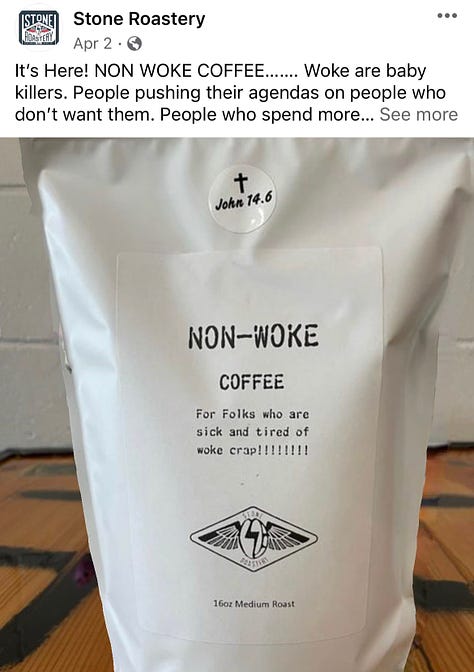
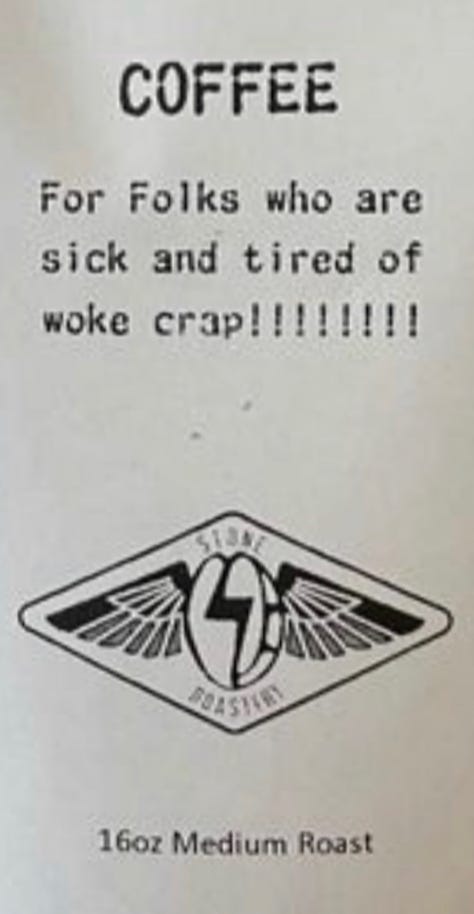
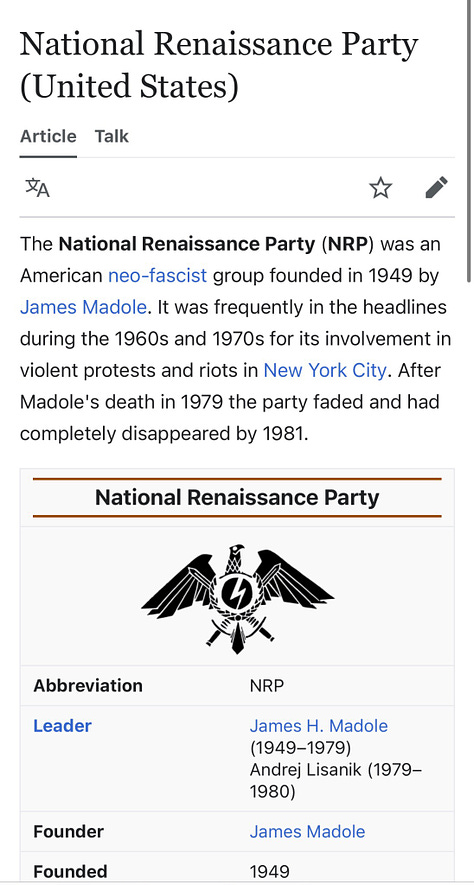
I know almost nothing about the guy who owns the company beyond the conclusions one can reasonably draw from the surfeit of MAGA memes he’s posted on Facebook. I know he goes to a right wing church in North Augusta, is an election denying fan of Trump’s, believes abortion is murder, and thinks that promoting non-woke coffee (with a perhaps coincidental 8 exclamation points after it) will attract more customers than it drives away. Is the guy an actual Nazi? I’ve found no evidence (apart from that fashy looking logo) that would suggest as much. Regardless, that logo is obtuse at best, a knowing wink to fascist comrades at worst.
It’s worth noting, for example, that Augusta, Ga (right across the river from North Augusta, SC) was where a white nationalist and antisemitic periodical called [ahem] The Thunderbolt was produced from the 1960s into the 1980s. [Rightlandia sidebar: Walter Huss had ties to people in the National States Rights Party, the organization that produced that periodical. In 1979, when Huss was chair of the OR GOP, copies of The Thunderbolt mysteriously appeared under the doors of every state legislator’s office. This happened to be a day when Huss (a resident of Portland, 50 miles away) was at the Capitol in Salem for a hearing. Perhaps a coincidence. Perhaps not.]
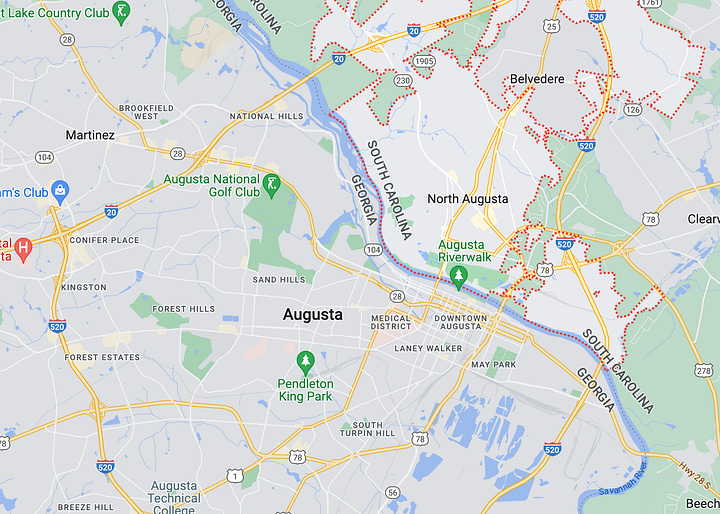

The Hermeneutic of Generosity
So what do we make of that “Christian Patriot” in North Augusta who happened to pick a Thunderbolt “S” and eagle wings for his coffee company’s logo in the late 2010s? Because I revile fascists and am familiar with their propaganda tactics, I have little reason to give them the benefit of the doubt. The idea that a middle-aged white conservative Christian in the Augusta, GA area would be unfamiliar with what a thunderbolt “S” signifies strains credulity…but it’s possible I guess. Just like it’s possibly a coincidence that the Oregon State Capitol building in Salem was flooded with copies of The Thunderbolt on the same 1979 day that Walter Huss happened to be in town.
While it is important for us to identify fascists and Nazi-sympathizers as such when we encounter them, it’s also important to note that there exist a good number of self-described “Christian Patriots” who hold many conservative ideas about social and political matters, and yet who also would authentically reject the idea that they were sympathetic to Nazis or other fascists. Simply calling such people “Nazis” on the basis of only a few pieces of evidence risks mischaracterizing their politics.
Now, lest anyone get the wrong idea, I am absolutely not endorsing the argument that saying negative things about Nazis turns non-Nazis into Nazis [as depicted in this iconic comic below].
But precise analytical terminology matters because there IS a difference, though perhaps only a small one, between Stone Roastery with its (accidental?) Nazi imagery, and this Indiana coffee company (below) that forthrightly owns their pro-Hitler stance. The “non-Kosher” certification they tout at the end is an especially creepy subculture of which I had been previously unaware.
For the purposes of contemporary political strategy or personal safety, the distinction between the far right, America First, populist nationalists at Stone Roastery who want to save Christian America and Western Civilization from the threat of “woke” Cultural Marxism vs. the far right, America First, populist nationalists at Above Time Coffee who want to save Christian America and Western Civilization from the threat of “woke” Cultural Marxism and who also openly celebrate Hitler, may very well be a distinction without a difference. I’m not trying to argue anyone out of that position.
But in my capacity as a historian who’s trying to write a history of far right anti-democracy that can hopefully do some small part to enrich our democratic civic culture, I believe there’s value in holding on to that distinction in my own writing. That’s what I mean by “the hermeneutic of generosity.” Absent strong evidence of someone’s Nazi or fascist proclivities, I prefer to provisionally withhold use of that term. I feel confident calling Huss and many of his associates “fascists with neo-Nazi sympathies” because I have evidence to back that up. But I also know that plenty of Huss’s political collaborators on the right were not closely familiar with his more radical commitments because Huss knew how to read a room. Had they known about them they would not have agreed. Such people were conservatives, but they sill accepted the basic tenets of multi-racial, religiously pluralistic democracy. Such people may have unknowingly enabled (or passively allowed) the rise of a Christian Nationalist, anti-democratic political culture inside Huss’s iteration of the Oregon GOP, but to ascribe the same responsibility to them as we would to Huss would create an inaccurate depiction of the historical processes in question. More importantly, it would render such a history less useful as an instructor for our present moment.
But they have a Bible verse on their coffee, how could they possibly be Nazis?
Several folks responded to my Twitter thread on Stone Roastery with a comment along these lines—WTF, they have a Bible quote AND Nazi imagery? Such responses remind me of the many times Oregon Republicans who knew Walter Huss have said to me “he was a devout Christian and a social conservative, that’s ridiculous to link him to Nazis.” Such comments sound incredibly naive to anyone who knows even a little bit about the history of the American far right, but we’re kidding ourselves if we think that more than 1-2% of white Americans actually know much about that history. That’s unfortunate and one could write a whole book about why this history is so little known, but it’s just the reality in which we operate. Mocking someone who would make a defensive comment like that, assuming it’s being asked in good faith and not in a trolling manner, does little good.
Instead, what if we took such naive comments as an invitation to have a conversation about how bible passages like John 14:6 have been deployed by white nationalist and antisemitic enemies of religious pluralism and multi-racial democracy in the American past. That conversation must start by first making it clear that no one is saying that all white American Christians are Nazis. Rather, the point is that SOME white American Christians *have been* Nazis or Nazi-adjacent, and so it’s not off base for a person to look askance at a Christian coffee logo with a thunderbolt “S.” If one truly is an American Christian who reviles Nazis, then there are simple things one can do to make your intentions clear, and one of them is NOT to simply regard a Bible passage as a “get out of suspected Nazi-land free” card.
The “hermeneutic of generosity” is the epistemological space in which we hold out the possibility that the Stone Roastery guy, if confronted with that Nazi imagery, would authentically say something like “oh no, I’m a Kiss fan and motorcycle/hot rod hobbyist who thought that logo looked cool, but now that you point out how Nazi-like it looks I’m embarrassed and appalled and will change it immediately so that my non-Christian and non-white neighbors know that I harbor no ill will toward them.”
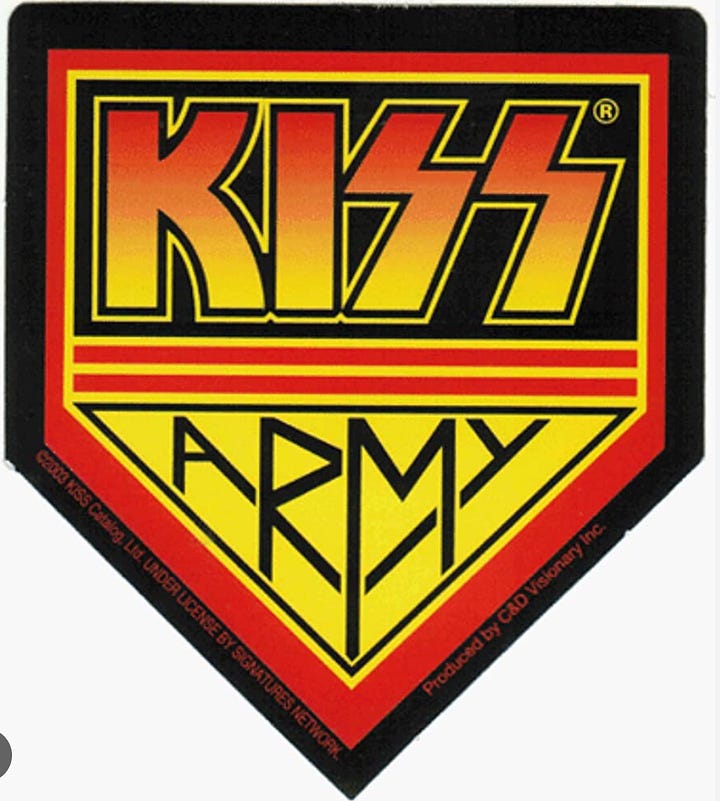
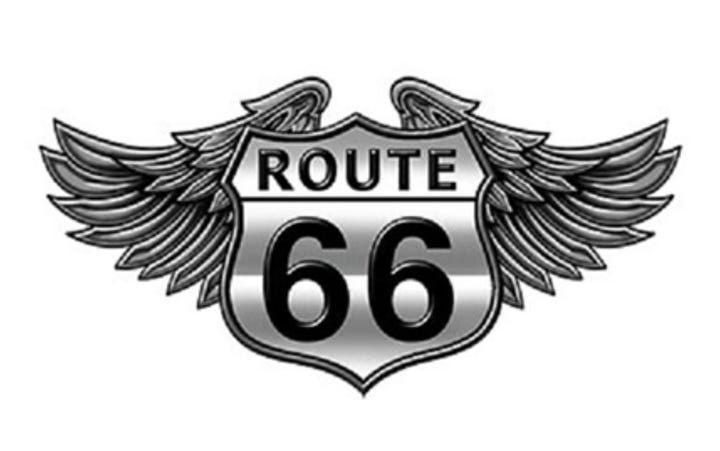
I wasn’t born yesterday. I fully recognize that the chances of those Stone Roastery folks saying something like that is close to zero. But I don’t think we have enough evidence to say that it is definitely zero. Those Above Time Coffee Nazis in Indiana, on the other hand, can go straight to hell without collecting a penny of my epistemological generosity. They have chosen to put themselves outside the boundaries of the American political tradition of multi-racial democracy, and so fuck them.
But for some of our self-described “Christian Patriot” neighbors, that coffee bag juxtaposing Nazi imagery with a Bible verse could be a learning moment. Seeing that John 14:6 reference on the coffee bag inspired me to search through my archive to find examples of how that specific passage—“I am the way and the truth and the life. No one comes to the Father except through me”—had been deployed by fascists in the American past. You’ll be unsurprised to hear that in less than 30 minutes I was able to find a good number of examples, two of which I’ll share with you here.
Here’s a 1982 passage from “Christian Patriot” Jack Mohr. Note his argument that one can’t be a true Christian if one refuses to identify the Jews/Communists as the real enemy of America. Mohr was part of the “Christian Identity” tradition that is one genealogical root of today’s Christian Nationalists.
The titles of the materials Mohr offered for sale on the back page of that pamphlet may ring a few contemporary bells some 40 years later—the plot to destroy Christianity, brainwashing, White Roots, the Real Enemy Exposed, etc.
This conspiracy-obsessed, apocalyptic form of Christian Nationalism informed the way John 14:6 is deployed in my second example. Jews, “Scriptures for America” claims, are “the real hate group” because they are Satan’s agents on earth. “The real problem,” however, is that the current generation of Christians aren’t fulfilling God’s wishes sufficiently. If they were, then they wouldn’t be suffering the wrath of “God’s judgement” in the form of the presence of “the Jews” in their country.
These two examples show us how Christian theology and the Bible were put toward violently antisemitic and white nationalist ends. While a contemporary conservative Christian would probably be taken aback by the rank antisemitism in these passages, I suspect that the general framework of the apocalyptic appeal and the depiction of “the enemy” might be uncomfortably familiar. The people who wrote these passages were violent and hateful people. Several of Jack Mohr’s disciples ended up committing hate crimes. People like Walter Huss who were drawn to such people thought of themselves as “Christian Patriots” who wanted to save America from the immanent destruction that “the radical left” was about to bring to America in 1982, 1988, 2002, etc. etc. etc. It was this (inaccurate) sense of urgency that led these “Christian Patriots” to embrace violence as a means of political change, thereby destroying many lives in the process, including their own.
Today we have quite an army of Jack Mohr-like preachers out there whipping up the passions of white Christians, but more importantly, we also have a presumptive GOP POTUS nominee who can’t stop blaming George Soros and other (((globalists))) for just about every imaginable national ill. We’ve already witnessed the sort of political violence that Trump’s supporters are willing to carry out, many of them in the name of the Christian God. For those fully committed to the Christian Nationalist project, there’s probably not much that can draw them out of that world. But for those on the edges of it, who perhaps have been taught to believe that their whiteness plus a Bible passage on a coffee bag is sufficient to inoculate it from any taint of fascism, learning about historical figures like Walter Huss or Jack Mohr might make them more likely to function as a democratic counter-weight in churches and communities where the forces of hateful anti-democracy are on the rise.





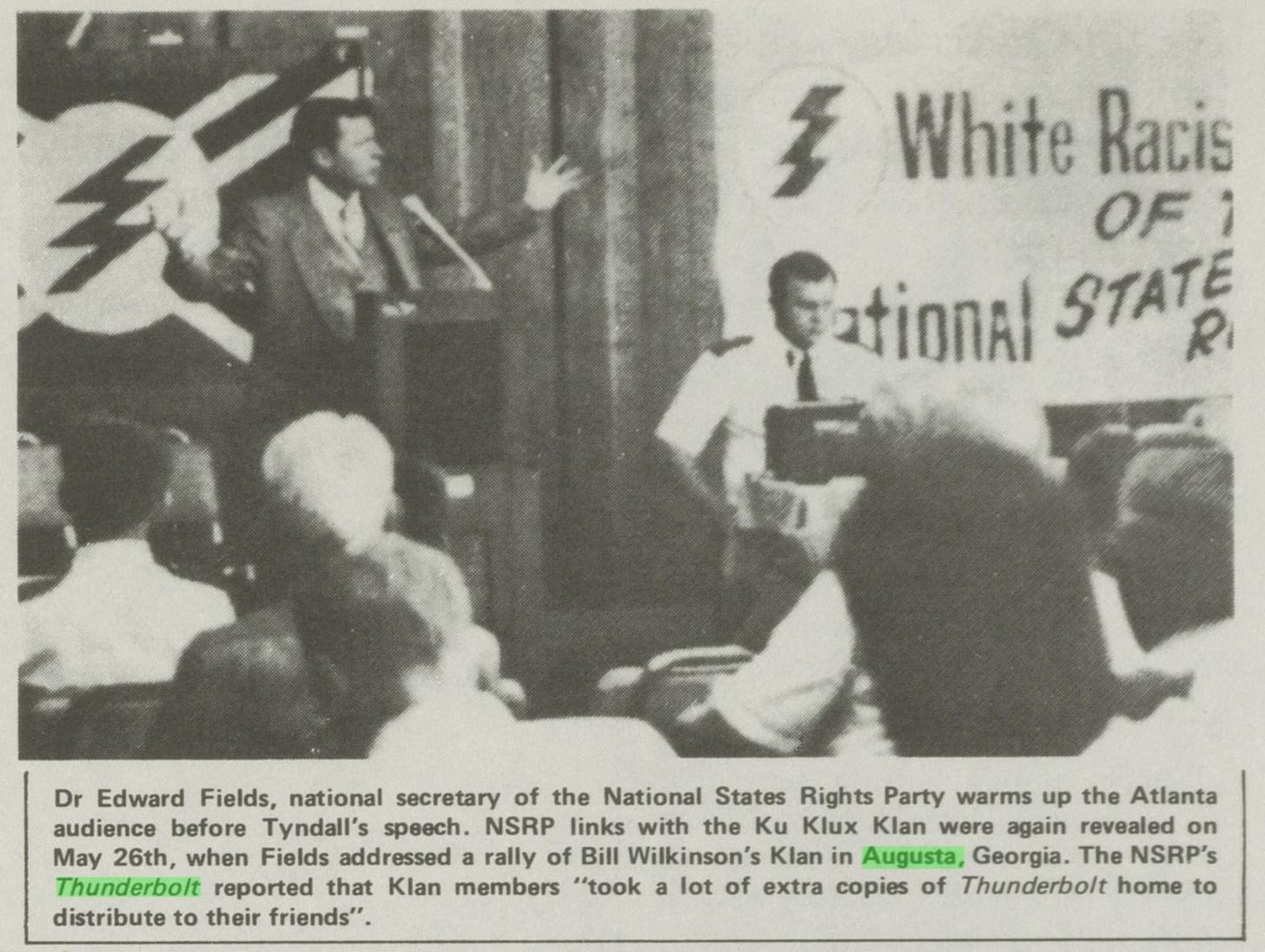
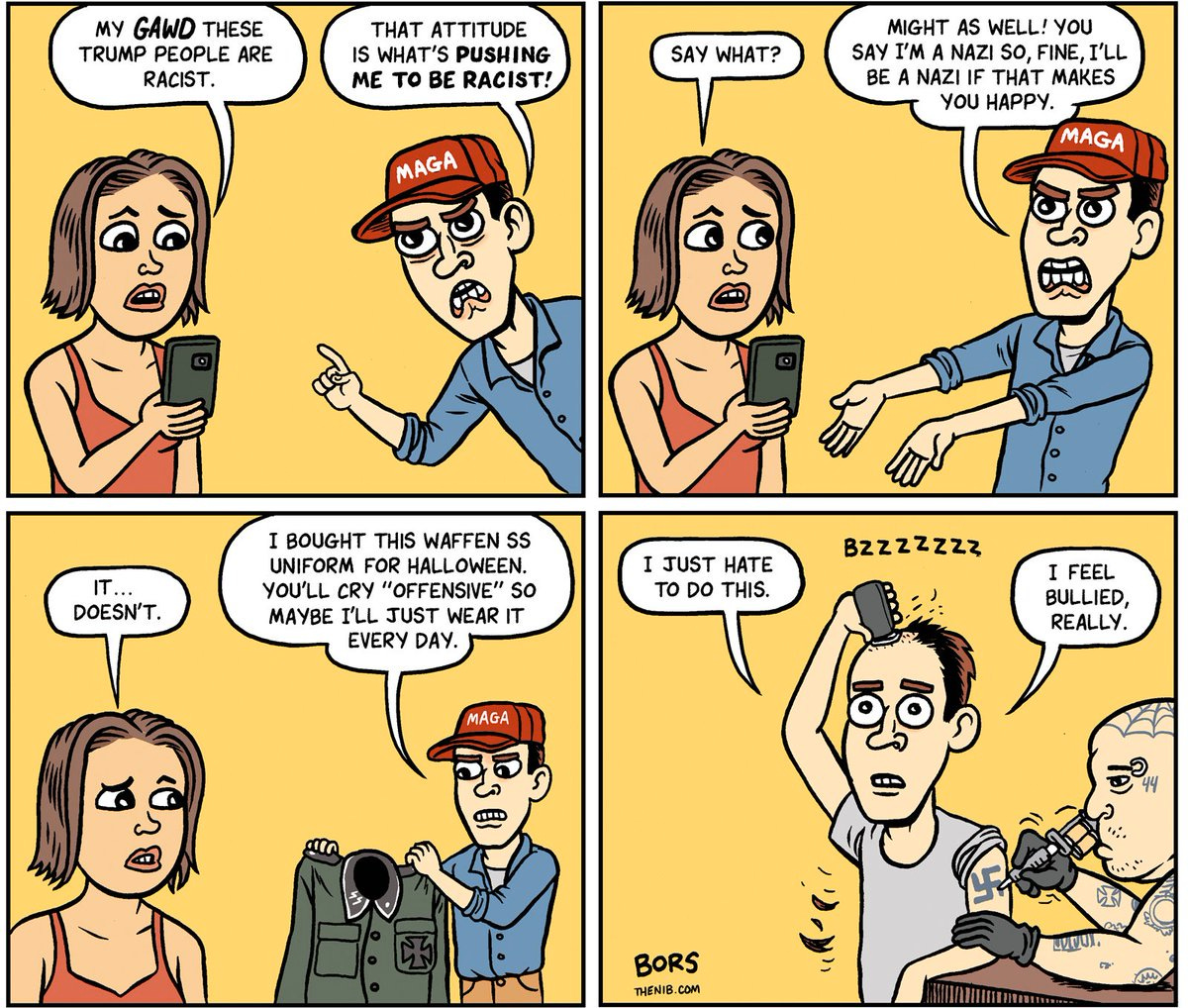
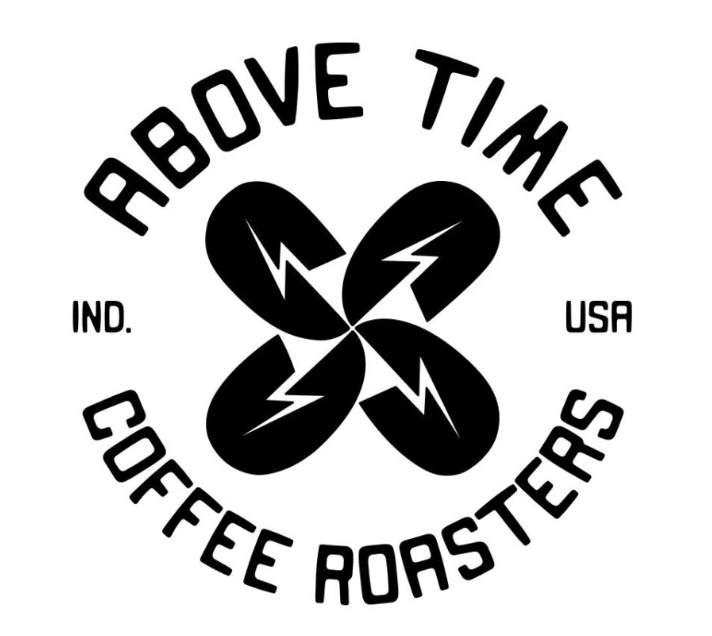
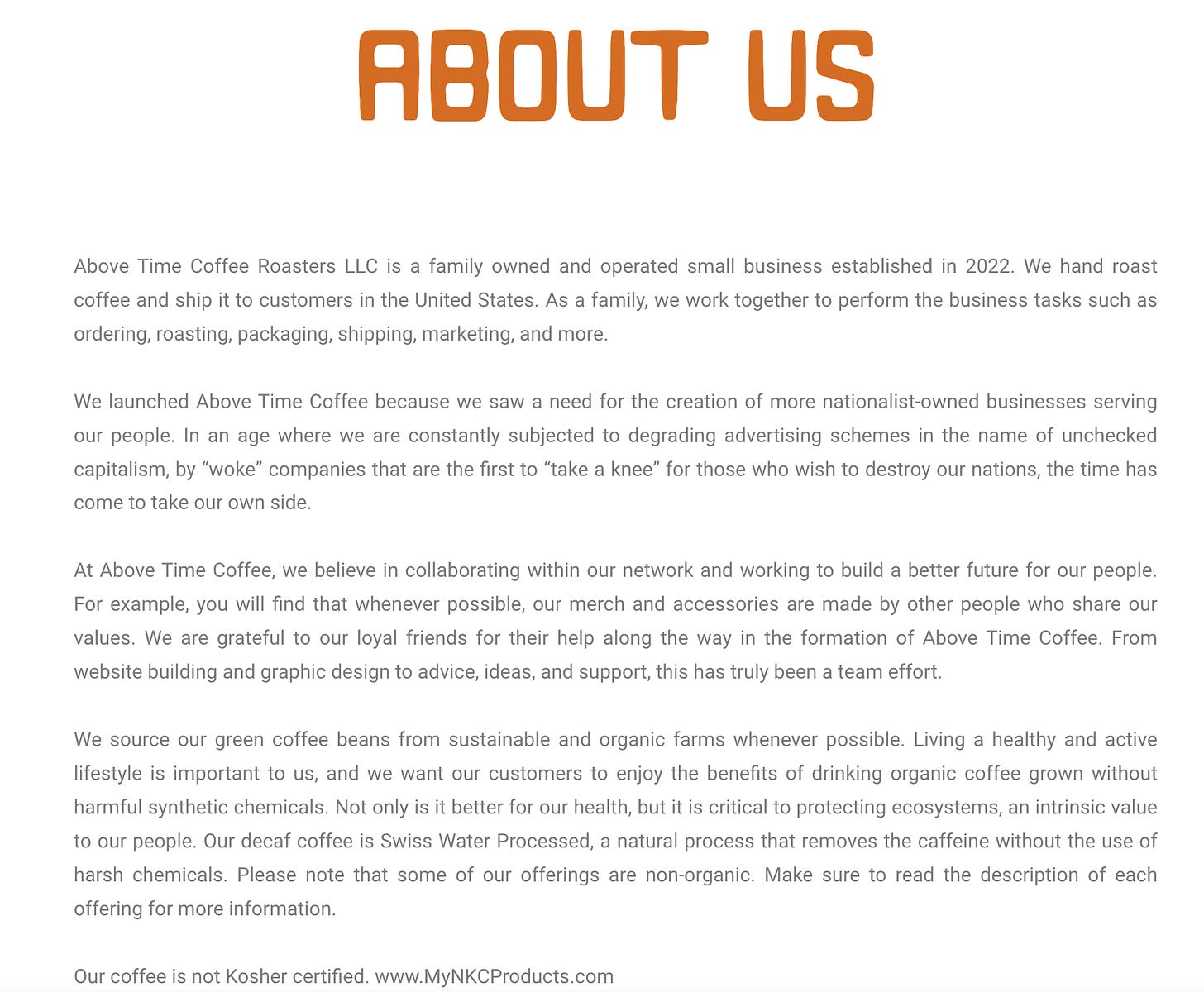

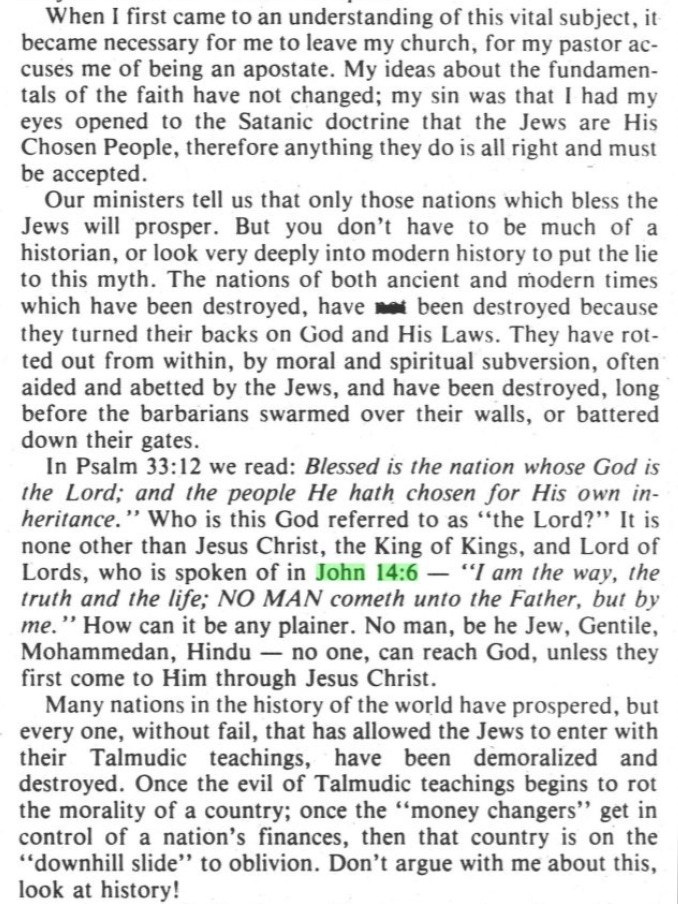

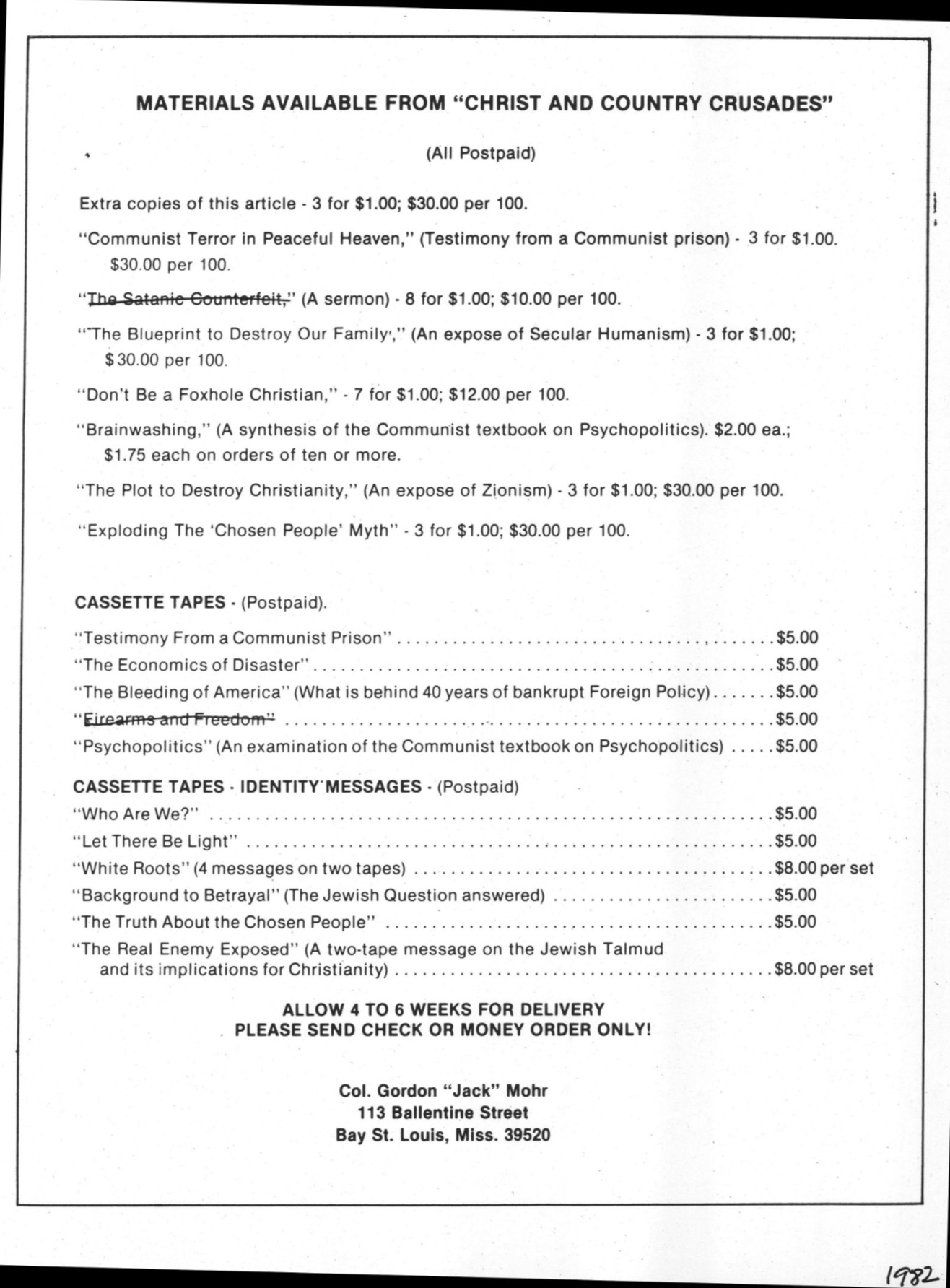
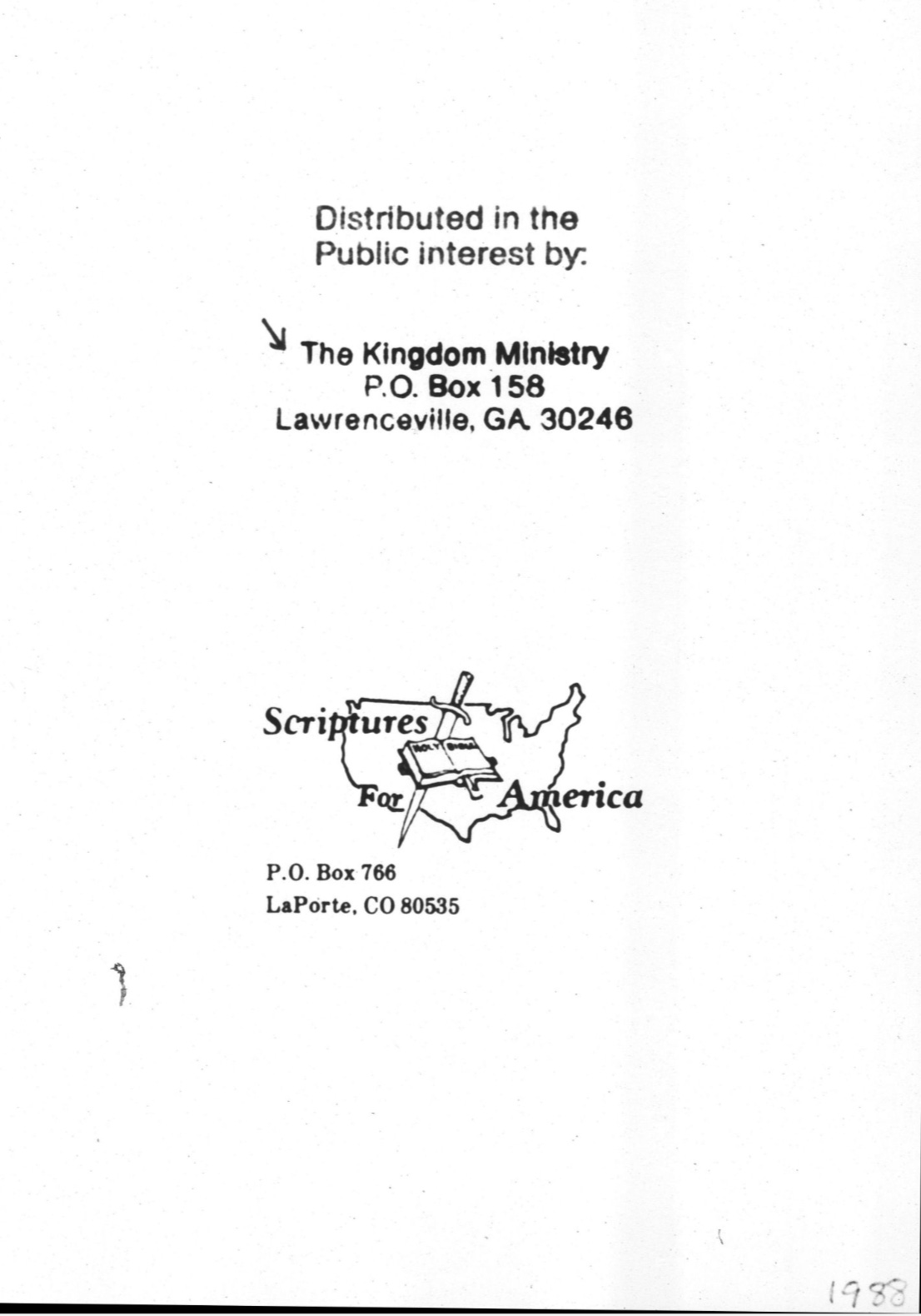
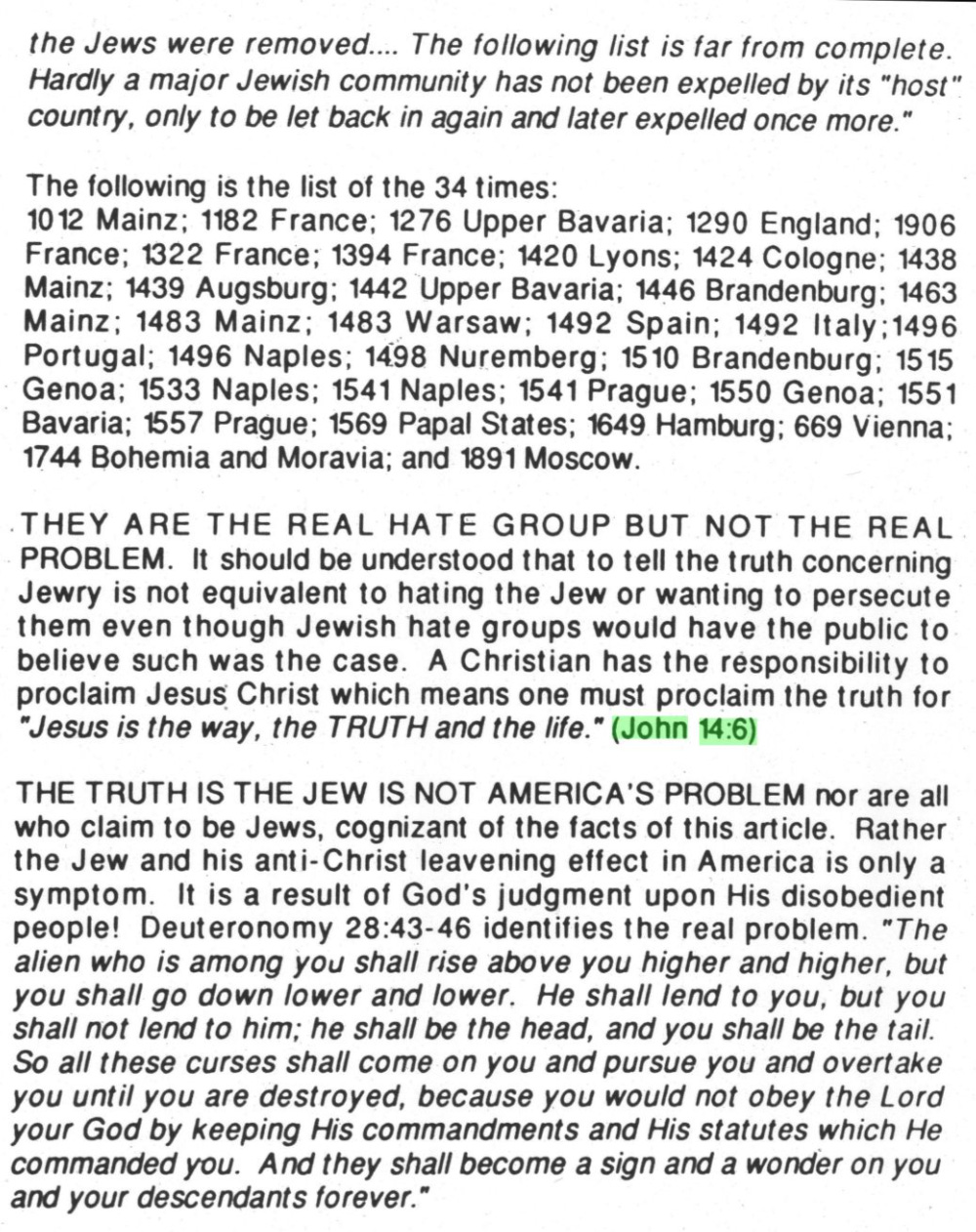
Where do people think Nazis got the anti-Semitism from?